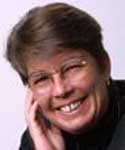-
- Report: Connecticut could lose $1 million a year if civil unions are allowed
- Video that raised conservatives’ ire to be distributed nationwide
- Gay-rights advocates file brief against 1913 Massachusetts law
- Washington Supreme Court hears same-sex marriage case
- Supreme Court to decide gay parenting case
- Gay couple sues for use of their photo in Internet ad
- National News Briefs
- World News Briefs
commentary
It’s time for a serious and compassionate dialogue
Published Thursday, 17-Mar-2005 in issue 899
CENTER NOTES
Our community continues to ride a roller coaster of emotions. Victory messages on one day, but on a different day, sad reminders of the battles we are losing.
This week, in the consolidated marriage cases, San Francisco Superior Court Judge Richard Kramer ruled that marriage discrimination against same-sex couples violates the California Constitution! While the case will be appealed to the Supreme Court, it is nonetheless a great victory and the ACLU of Northern California, NCLR and Lambda Legal deserve our grateful thanks for all of their hard work on these cases.
But two weeks ago the news was not so inspiring. The news out of New York City about a possible “super-virus” – a drug-resistant and aggressive strain of HIV – contracted by a man who reportedly told health officials he used crystal methamphetamine and had unprotected sex with hundreds of partners, calls our attention to a different, more challenging community issue.
Even as we begin to make progress toward full equality, the vestiges of a different time continue to ravage our community. According to health officials, the LGBT community in Southern California has one of the world’s highest rates of methamphetamine abuse. And it’s no surprise that this drug has found a particularly comfy home in our midst. Every health expert in the world understands the relationship between increased risk behaviors and the repeated denial of basic human rights.
Every day at The Center, we see LGBT community members who have been told that their sexual orientation is immoral and perverse, their sexual behaviors are “disgusting” and that their lives have no value. All of that sets a perfect stage for meth – a drug that heightens sexual feeling, removes doubts and inhibitions, and can make the user feel incredibly beautiful and powerful. Shame and self-doubt are banished, if even just for a night or a weekend.
And even as we understand the pull and attraction, we are also aware of the consequences of methamphetamine use on our fellow community members, our colleagues, our friends and family members. The role of methamphetamine in increasing the HIV infection rates, in contributing to the spread of a super-virus, and in ultimately damaging the lives of those we love is a huge community issue, albeit one we discuss only privately.
The Gay & Lesbian Times is right to call for a community-wide dialogue. But it’s a difficult dialogue to have. No one wishes to demonize those who use, or to begin an overly moralistic and harsh dialogue that will further damage and divide us. None of us wants to begin a dialogue that is sex-negative or further condemns those who have been condemned far too often in their lives. But continuing the silence would mean continuing to watch too many destroy their own lives and the lives of those who love them.
The dialogue we must begin is a dialogue of compassion, compassion for those caught up in meth abuse and in need of resources that are all too scarce. A dialogue that keeps in mind that no one who is abusing or addicted to meth set out to accomplish that goal. In fact, like most other drugs, it’s often very difficult to tell at the outset which of those folks just using “recreationally” will be the user that after only three to six weeks finds themselves in the grip of a powerful downward spiral.
It’s also a dialogue that can help to breed community commitment, commitment to the public health policies and resources that can help move us toward greater awareness of the hidden dangers of meth – the drug that some health officials call the most dangerous among all of the party drugs. A community commitment to do the research and discover what kinds of campaigns, policies and programs can help us and help our brothers and sisters. Methamphetamine is destroying too many of our best and brightest and we cannot stand idly by.
While it is a difficult dialogue, it’s one we must begin. We know all too well the terrible consequences of community silence.
“Even as we begin to make progress toward full equality, the vestiges of a different time continue to ravage our community.”
|
|
Copyright © 2003-2025 Uptown Publications


